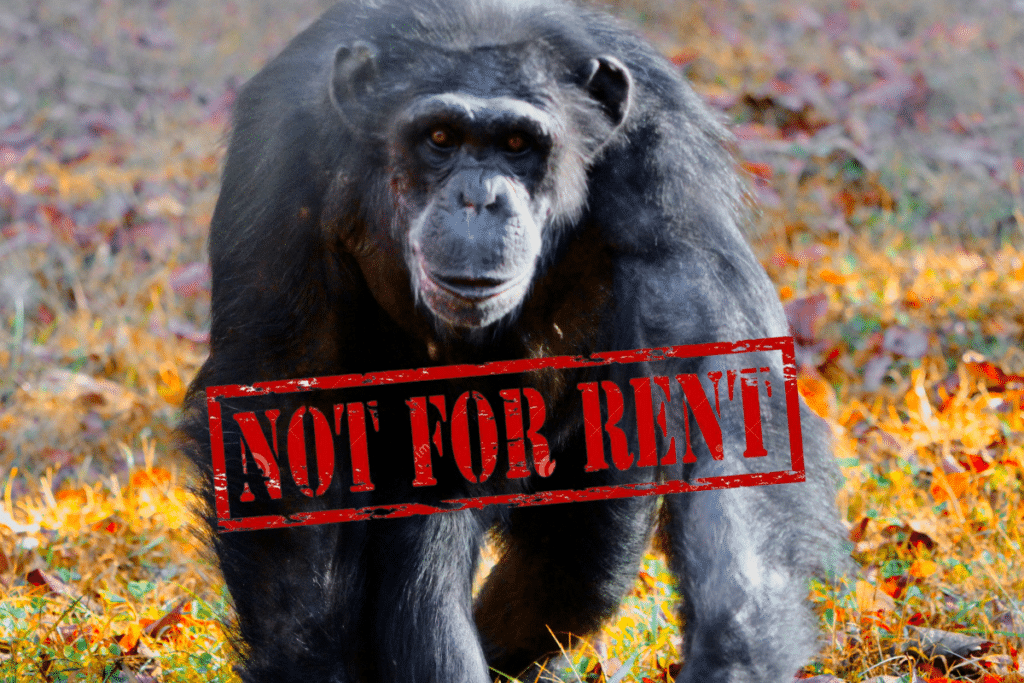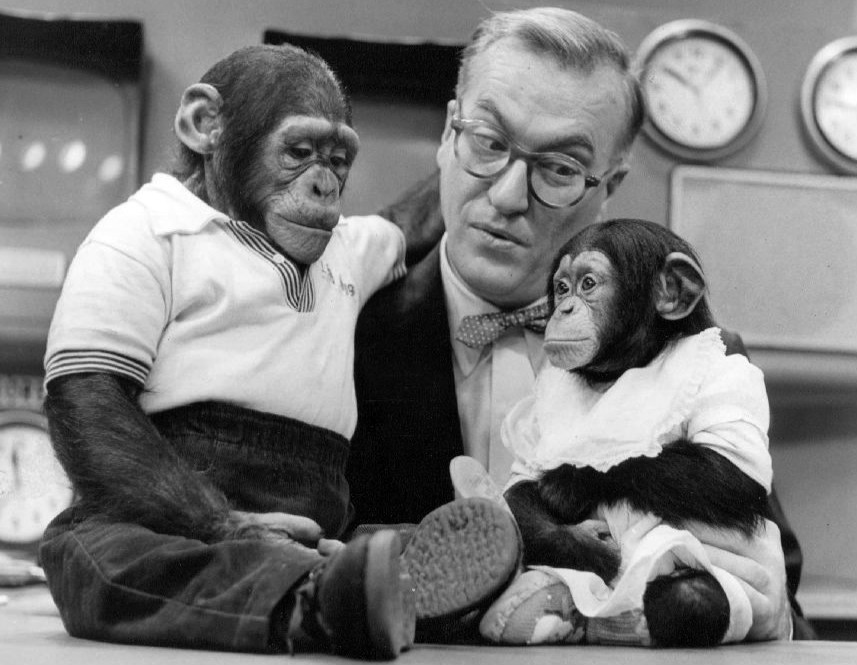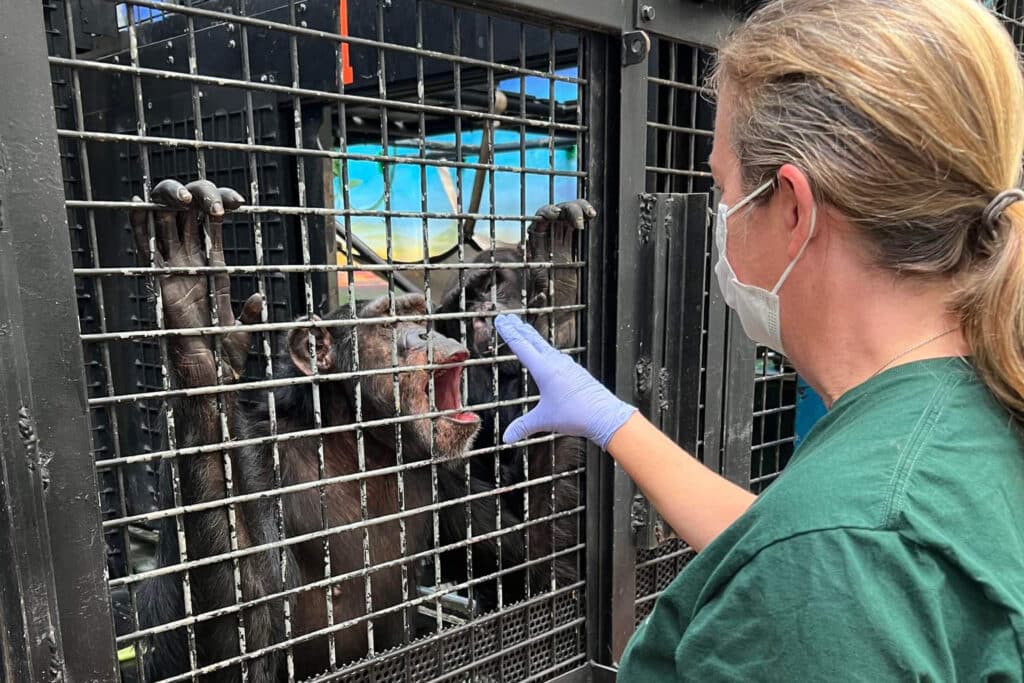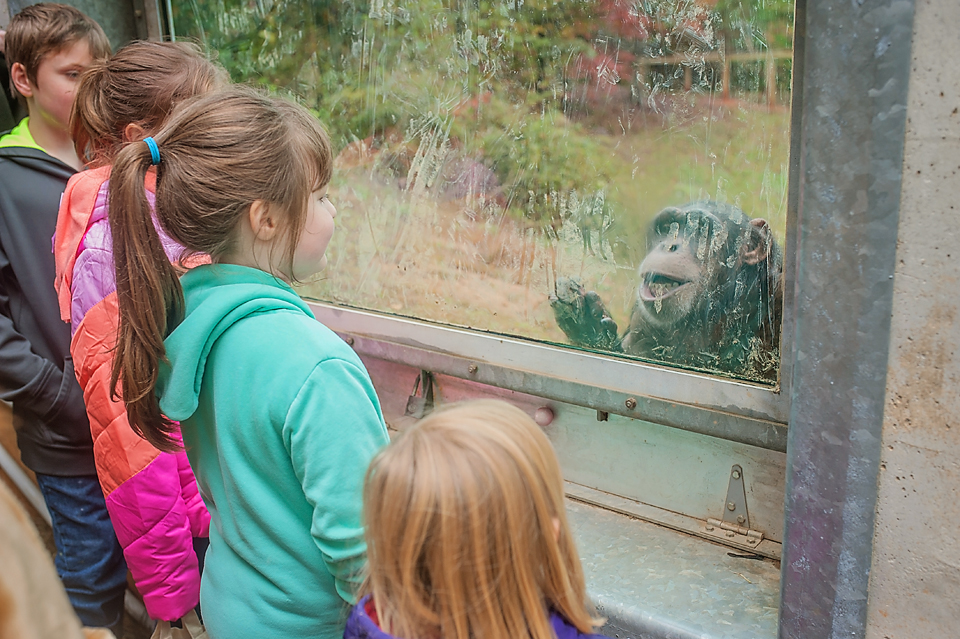
Can I Rent a Chimp for a Day?

By Marissa Pena
If this question surprises you, you’re not alone! Longtime chimp-enthusiasts and animal advocates alike are no doubt immediately skeptical of the idea, and for good reason. But for new learners? Renting a chimp might sound like a great way to meet our closest relatives, especially if they have good intentions. Unfortunately, this is far from the reality.
According to Google Trends, the phrase “rent a chimp” has resurfaced several times over the past year. It only takes one search to reveal dozens of websites offering to rent out non-human primates for parties or events. But while they promise a fun and educational experience, the reality is an industry built off harm and exploitation.
Chimpanzees in Entertainment
The long history of chimps in entertainment goes back well before their first film appearance in the 1930s. Before then, chimpanzees were heavily featured in circuses and live performances, often dressed and forced to act like humans. When NBC’s Today show was launched in 1952, low ratings nearly led to cancellation until they found a new co-host — J. Fred Muggs, a chimpanzee.

Muggs was selected for the role when he was only 10-months-old. Chimpanzees don’t reach maturity until about 16-years-old and are still wholly dependent on their mothers until they’re about 5. But while Muggs remained on the show for a 5-year contract, he was ultimately replaced by another “more agreeable” chimp when he began to act out.
Sadly, this is not at all an uncommon practice. Chimpanzees are individuals with distinct personalities and their own wants and needs. Once they begin developing as adolescents, they become too strong or “difficult” for those in the entertainment business to handle. As a result, the chimpanzees who were used in entertainment were all almost exclusively under the age of 8 years old.
How Animal Entertainment Warps Perceptions
Unlike humans who have the choice to become entertainers, chimps were often bred into the industry. They were separated from their mothers at birth and were sometimes even obtained through illegal animal trafficking or poaching. And once the industry could no longer use them? Many found themselves in non-accredited zoos or sold as pets into unsafe and uncomfortable living conditions.
An additional consequence is how this can warp the average person’s perception of chimpanzees and other non-human primates. Project Chimps is proud to be part of NAPSA, the North American Primate Sanctuary Alliance, which advocates for primate welfare. Part of their advocacy is built on educating the public about these issues they otherwise might not be aware of. As such, we spoke with NAPSA Program Director Erika Fleury about some of these misconceptions.
“The reason why some people may still think you can or should “rent a chimpanzee for a day” is because young chimpanzees were used frequently in entertainment, which gave the impression that these animals are tractable and friendly, sort of like a more-humanized dog,” she says.
“What people don’t know is that only very young chimpanzees could ever perform in front of a camera or on stage, and that once they grow up a few years they become too strong and rebellious to be handled safely by humans. Then, ‘undesirable’ older apes were often dumped at roadside zoos and in private homes, where they continued to receive substandard care for the many decades left of their long lives.”
The Rent a Chimp Industry
But when people have previously only seen chimpanzees on TV, they’re only getting part of this story. And it’s these often well-meaning people who may look to questionable primate rental services without understanding the risks involved.
“NAPSA often speaks out about primate handling and use in entertainment because the public does not always understand the strength, complexity, and intelligence of nonhuman primates,” Fleury explains. “It takes much training to learn how to safely be around chimpanzees in captivity, and even more training to learn how to care for them on a daily basis.”

The truth is, chimpanzees are strong, clever, and complex individuals. They have never been suited for human entertainment, which is why the industry relies on only using very young ones. They are not domestic animals, and bites from chimpanzees can cause severe or even life-threatening injuries.
“Temporary rental and handling of a chimpanzee would be terribly dangerous to both the human and the chimp, and could result in the chimp getting loose, attacking, and causing fatal injuries. Oftentimes, when a chimpanzee attacks a human, law enforcement shoots and kills the chimp, so an attack would be equally harmful to all individuals involved.”
Harm and Exploitation
And according to experts, this has lasting psychological effects. NAPSA has been leading the Chimpanzees in Need rescue effort since 2019. The program focuses on the safe rehoming of 40 chimps from a L.A. animal refuge that suddenly shut down. She said one of the chimpanzees most in need of attention was Jeeter, a 35-year old male most likely bred to perform as an entertainer, but who had been raised in a human home.
“Because he was not given sufficient opportunities to socialize with other chimpanzees, Jeeter never learned how to communicate with them. The other chimpanzees didn’t understand him, and he didn’t understand them,” she said. “He was housed alone for years at the shut-down refuge because when they tried to introduce him to other chimps, he was bullied.”
Under expert care, NAPSA was thankfully able to rehome Jeeter to an accredited sanctuary that could meet his complex needs!
Is it Legal to Rent a Chimp?
As of 2015, it became illegal to buy, sell, or “rent” captive chimpanzees in the U.S. without a permit. However, private ownership of certain primates is still legal in some states, which can open the door for further mistreatment.

“Thankfully, nobody can rent a chimpanzee in this country,” says Erika Fleury. “There are still harmful practices out there, though — particularly online content from exploitive facilities that show chimpanzees being handled by humans, wearing clothes, and engaging in unnatural behaviors.”
According to a 2011 study, this type of content has a negative effect on chimpanzee conservation and furthers public misunderstanding. People who see it are more likely to believe chimpanzees make good pets and underestimate their status as endangered animals.
That’s why experts like Erika Fleury ask that the public ignore such dangerous content. “Every comment, view, and share gets the exploiters the attention they crave, which will lead to more exploitation!”
How Can We Help?
Unlike companies that knowingly exploit primates like chimpanzees, most people today are simply unaware this exploitation is even happening. By looking to rent a chimp for an office or birthday party, they’re likely just trying to learn about them. That’s why we want to provide some safe alternative options for animal lovers wanting to support the welfare of chimpanzees!
“The best way to enjoy this fascinating species and protect them is by supporting an accredited sanctuary.” Fleury says. “True primate sanctuaries are nonprofit organizations who rely on public support, and they are more in demand than ever before! Though sanctuaries keep animal welfare as their top priority and are not open to the public, most do allow a few days a year where donors can come in and – at a safe distance for everyone – see the great work being done.”
At Project Chimps, we host Discovery Days when visitors can come and tour the sanctuary. We also offer private tours as an option for groups who want to learn more about and support the work we do. And nearby, visitors can hear chimps from our beautiful hiking trails and campsite!

If you’re looking to host an event, you can always check with accredited zoos or sanctuaries. While not all sanctuaries can accommodate events, Project Chimps offers a large event field behind our historic homestead cabin. Responsible zoos and sanctuaries don’t allow guest handling in order to protect the safety of the animals in their care. However, event rental can be a wonderful way to financially support accredited facilities that prioritize animal welfare!
What’s more, there are lots of other ways to learn more about chimpanzees! Documentaries that responsibly observe chimps in their natural habitat are fantastic educational resources to see chimps in the wild. Project Chimps has its own YouTube channel where we post tons of educational content about the chimpanzees in our care.
“There are lots of ways to enjoy and celebrate our closest relatives in ways that do not threaten their well-being and allow them to lead peaceful lives without further human interference,” says Fleury.
By speaking out against the exploitation of our closest living relatives, you’re already being an ally for chimpanzees everywhere. Organizations like Project Chimps and other NAPSA sanctuaries rely on the support of people like you to continue running. Thank you so much for helping us end chimp exploitation in entertainment by spreading the word and supporting our work.
If you’d like to further support our mission to provide exemplary lifelong care to chimpanzees, please consider donating today!

